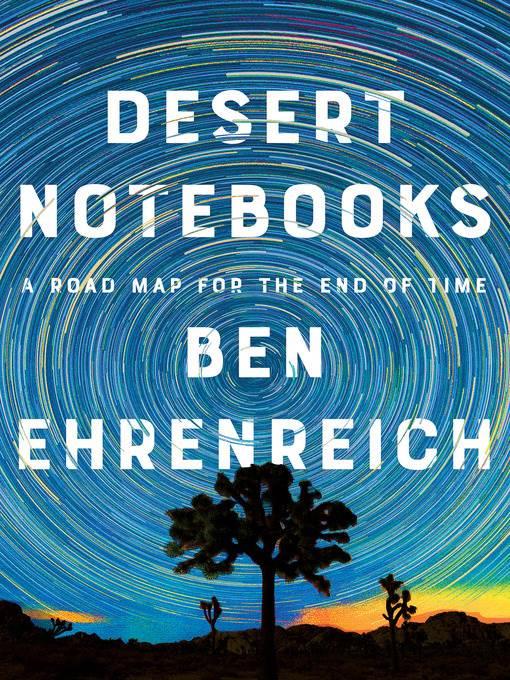
Desert Notebooks
A Road Map for the End of Time
- اطلاعات
- نقد و بررسی
- دیدگاه کاربران
نقد و بررسی

March 2, 2020
Nation columnist Ehrenreich (The Way to the Spring) critiques notions of progress he sees as having brought civilization to the point of disaster in an erudite philosophical work about the prospect of climate change. Against the backdrop of his wanderings through the Mojave Desert and a bleakly rendered Las Vegas, he juxtaposes stories from indigenous cultures—both of creation and of the devastating arrival of Westerners—with explanations of how modern Western thought developed, such as the adoption of Greenwich Mean Time, or of hourly pay during the Industrial Revolution. He also includes passages in which he reacts to the latest disturbing environmental and geopolitical news. The prose is at its best in the desert, where, for instance, “little jeweled crickets,” dead and encrusted in salt, lay scattered in Death Valley. Coming upon a 12,000-year-old creosote bush prompts Ehrenreich to reflect that time might be understood “as a circle that expands out of sight, invisible roots that grow and grow even as the parts we can see die off.” Suggesting that humanity must go beyond “the stories that have been winning out these last two-hundred-and-change-years,” Ehrenreich creates a beautiful meditation on adapting to future cataclysm.

May 1, 2020
Although the subtitle says "road map," readers won't find here specific directions on managing climate chaos or geopolitical turmoil. Instead, journalist Ehrenreich (The Way to the Spring) offers a series of stories. He challenges the dominant story of us, the one built upon the "myth of human progress"--this, he argues, is what brought the planet to the precipice. The book's reach is impressively wide, including history, ecology, philosophy, ethnology, and literature; it is also richly peopled, with stories from Ehrenreich's own life, along with anecdotes from the Maya, Greeks, and Egyptians. Throughout, readers are reminded of the perilousness of the current moment; dense, ponderous passages on myth or history are interspersed with sharp entries about commentary on the happenings of the Trump administration. More pleasing observations of Mojave Desert natural phenomena, such as its dazzling night skies, flora, and fauna are also noted. VERDICT Richly evocative, this is a book that begs to be reread, both for its biting social commentary and its wholly original contribution to the literature of planetary catastrophe.--Robert Eagan, Windsor P.L., Ont.
Copyright 2020 Library Journal, LLC Used with permission.

May 1, 2020
An urgent plea to revise our relationship to the planet, each other, and time. Journalist Ehrenreich, a contributor to the Nation as well as many other publications, offers a thoughtful, often stirring, meditation on nature, myth, philosophy, politics, and time from the vantage of two starkly different desert environments: the "surging beauty" of Joshua Tree National Park and the assaulting seediness of Las Vegas. The desert, he observes, "enforces its own perspective. It shrinks you and puts eternity in the foreground." Eternity is much on Ehrenreich's mind as he considers the dismal prospect of "real, planetary disaster" and wonders whether literature, including the vocation of writing, may be pointless. The author is by turns melancholy, pensive, and, above all, angry: notably, at the "short-sighted, addled, deluded, demented, arrogant, venal, and vain" president he refers to as the Rhino; at climate change deniers; and at "overconfident elites" who propagate the ideology of progress. For Ehrenreich, progress is anathema. Along with a lyrical, freshly observed record of exploration, the author puts forth a manifesto against the prevalent, and destructive, notion of time--"the one that rules most of our lives and how we live them," that insists on history as a linear progression exalting white Europeans, and that depends on "the illusion of eternal, self-sustaining growth" to justify the exploitation of peoples and environments. He draws on astronomy, archaeology, anthropology, and ethnography as well as Greek, Roman, Mayan, and various Indigenous people's mythologies, especially as they evoke owls, widely depicted as "omens or messengers" of "death and war and maybe also wisdom." Ehrenreich cites abundant literary and philosophical sources, including Borges, Beckett, Hegel, Rousseau, and Walter Benjamin, to create a rich tapestry of ideas that cohere into "an audit, a foreclosure, a notice to appear," and a declaration of "the all-but-lost art of speaking truth to power." Well-informed and -rendered, passionate reflections on humanity's prospects.
COPYRIGHT(2020) Kirkus Reviews, ALL RIGHTS RESERVED.




دیدگاه کاربران